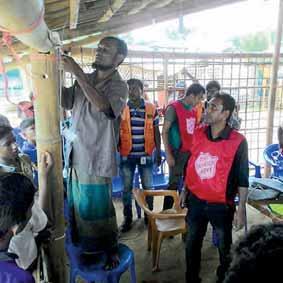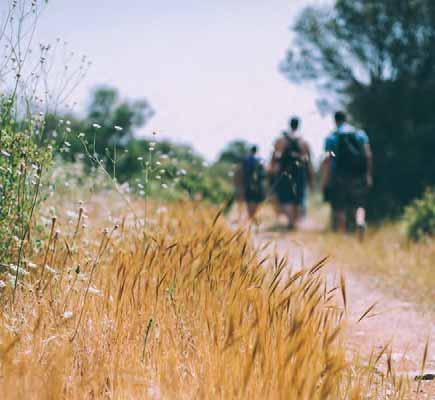
15 minute read
Interview
Help in a crisis
International Projects Office Team Leader Ben Gilbert concludes a series exploring the UKI Territory’s international development work by discussing emergency response with Project Adviser Jason Emmett
Jason E m mett
RESPONDING to people at a time of crisis is right at the heart of how The Salvation Army works. Corps and centres around the world have responded to their communities’ needs during the coronavirus pandemic. Emergency response work also continues in other areas too. Jason Emmett explains more about the emergency projects supported by the territory’s International Projects Office.
WHERE ARE EMERGENCY RESPONSE PROJECTS TAKING PLACE?
We are currently supporting projects in Ghana, Zimbabwe, Mozambique, Kenya, Mexico and Pakistan, most of which are working with communities that have immediate needs – for example, the provision of food, water and sanitary items. There are also projects raising awareness about Covid-19 and how communities can prevent the spread of the virus.
WHAT IS INVOLVED IN INTERNATIONAL EMERGENCY RESPONSE PROJECTS?
We work closely with the International Emergency Services Department based at International Headquarters to respond to communities on two fronts. First, there are rapid response projects that meet immediate needs. Second, longer-term intervention. This might be the provision of a mobile health clinic, which could run out of an established Salvation Army hospital, or the building
Rohingya refugee camp
of shelters. Sometimes it involves a unique response, such as providing solar panels for Rohingya refugees.
WHAT IS YOUR ROLE?
My role is to oversee projects that are happening around the world and, where donors have kindly given funds, see where the money could best be used.
WHY IS IT IMPORTANT FOR THE ARMY TO INVEST IN INTERNATIONAL EMERGENCY RESPONSE?
When an emergency or disaster takes place, these projects are usually the first phase within a community of response. That transitions into a recovery phase, which we hope will lead to longer-term intervention within the community. We see that happening where we already have community development projects, such as anti-trafficking or safe water.
Investment in emergency response gives us the ability to protect and build resilience within the work that we’re already doing, but also helps us to connect with new communities.
In some emergency situations our rapid response projects lead us to more
Fixing solar panels for refugees

remote communities that need help. As a result, good community connections begin to develop in a new area where the Army doesn’t have any established programmes, and a risk response can become a long-term project.
Episodes of the Develop podcast are available on Apple Podcasts, Spotify, Soundcloud and Google Podcasts Find more information and resources at salvationarmy.org.uk/international-
development
The next adventure
Discover a new way to work out your faith in the latest edition of the territory’s
HOW do you keep fit? Looking after physical, mental and spiritual fitness is essential to wellbeing but, during times of isolation and lockdown, many people find it difficult to know how to keep in shape.
To offer a helping hand, the Enabling Mission Unit has published Venture Out, a series of sporting resources combining daily devotions with physical exercise and a focus on wellbeing. In the latest edition, Venture Out Today, participants are encouraged to focus on five ways to maintain good mental health and wellbeing while engaging in physical activity.
Venture Out Today uses four main exercises – walking, running, cycling and home workouts – to explore verses from a paraphrase of Romans 12: ‘So, here’s what my daily reaction needs to be; to take my not-so-ordinary, everyday activity and exercise life, letting go of negative outlooks and making my daily allowance of training, sport and fitness a genuine expression of worship, thankful for all God has to offer me’ (v1*).
Participants will use this as they venture through the material to receive coaching from God’s word while going further and deeper with him in their everyday lives. They will also explore the New Economics Foundation’s Five Ways to Wellbeing.
The Five Ways are a focus to help people improve their understanding of mental health. They provide a framework in which to become physically, mentally and spiritually fit, whatever situation people find themselves in. Combined with sport, fitness and recreation time, this provides an avenue to improve and maintain a healthy mental and spiritual state.
‘Have the energy and enthusiasm to serve the Lord, and keep your fire burning. Show to others the impact of the Holy Spirit through who you are, run from and play in defence of those playing dirty. Hold on to good principles and be humble, allowing him to constantly recharge your excitement for doing his work and content with second place’ (Romans 12:9 and 10 paraphrased*).
An essential aspect of the material is its flexibility. It can be approached in whatever way benefits people most, and they are encouraged to adapt it to focus on whichever topics are relevant to them. The material can also be used in small groups. With plenty of questions to dig into, there is a lot to discuss and discover.
Participants will also deepen their relationship with God by considering questions based on three ‘A’s: assess, action and apply. This cycle is a blueprint for nurturing, processing and developing a discipleship journey. They can also be used apart from the course in personal times of reflection and discipleship.
With the ever-changing state of lockdown, Venture Out Today explores even more ways to apply each theme in the time beyond the coronavirus pandemic. This extra material provides further applications for connecting the Five Ways to Wellbeing and spiritual health in everyday sporting activities with whatever restrictions are currently in place. Whether venturing out at home or returning to gyms and fitness classes, there are many opportunities to be salt and light to people.


fitness resource
‘If you see someone struggling – help them! Hold them up in prayer, send them a message, give them a call to give words of encouragement. Win people over with kindness. Let the challenges and setbacks make you even stronger and achieve more, get the best of the worst by showing God’ (Romans 12:20 and 21 paraphrased*).
In whatever way participants decide to approach the material, Venture Out is a simple framework to help people unpack the Bible in a way that is meaningful to them, whether that is alone or in a small group.
Now more than ever, it is essential to understand the ups and downs, twists and turns, questions and revelations of a journey with God. Venture Out Today encourages participants to be inspired, challenged and moved by God. This journey is not for the faint of heart – after all, it is a venture of faith. All Venture Out resources are available from salvationarmy.org.uk/resources/
coronavirus-response-resources THE FIVE WAYS TO WELLBEING

The Five Ways to Wellbeing are Take Notice, Keep Learning, Connect, Be Active and Give.
This framework is a set of evidence-based public mental health messages developed by the New Economics Foundation. They give guidance for improving the mental health and wellbeing of the whole population.
Each of the Five Ways helps to make a positive difference in how people feel and how they live their lives. Including these simple actions every day can improve mental health and wellbeing. Find out more by watching Mental Health Ireland’s short video at youtube.com/
watch?v=bsc2QkCC3uI THE THREE ‘A’S

These will help people nurture, process and develop themselves on their discipleship journey.
Assess The starting point. Before setting out on a venture combining sport and wellbeing, it is essential to focus on the here and now, both physically and spiritually. Participants are encouraged to ask themselves what they currently know or believe.
Action These prompts help put each of the five ways to wellbeing into action and to ground participants in God’s creation. This step helps people think about what they could do in their everyday lives and how they could move beyond their starting point.
Apply Participants are encouraged to consider how they will apply each of the five ways to wellbeing. Some practical suggestions show how people can do this in their everyday lives.

What’s it all about?
Major Graham Mizon reflects on what ‘going to the meeting’ really means

APART from online worship, it has been several months since I attended a Salvation Army meeting. When I am able to return I would want to attend at my convenience, wear slippers and have copious amounts of coffee. On a less frivolous note, this unprecedented and lengthy break due to the coronavirus pandemic has provoked me to ask simple, but difficult questions. What is the Church all about? What do I want to go back to?
If I am raising questions that others have also contemplated, I would like to invite you on a brief journey of discovery. I hope the inclusion of John Oxenham’s beautiful words from No 777 in our songbook will also aid some moments of reflection on the way.
TENT OF MEETING
The first step of this journey is to reflect on the fact that Moses regularly met with God without ever attending church – for the very good reason that nearly one and a half thousand years would pass before going to a church would even be possible. Improvisation was needed and, just as The Salvation Army began its life as a mission in a tent, Moses set up a ‘tent of meeting’ (Exodus 33:7) outside the camp at the foot of Mount Sinai. Here he met with God ‘face to face’ (v11).
If you have visited the Western Wall in Jerusalem – or seen pictures of it – you will have noticed Jewish men with prayer shawls draped over their heads. This blue garment with tassels is known as a talith, formed of two Hebrew words: tal, meaning ‘tent’, and ith, meaning ‘little’. Just as Moses stood in the presence of God in his small tent, so observant Jews today recreate a ‘little tent’, not only to observe God’s command (see Numbers 15:37–39), but also so they can worship God intimately and privately.
In the hustle and bustle that is Salvation Army life, do I find those places and moments when I can commune with God? Does my corps facilitate and encourage that?
’Mid all the traffic of the ways, Turmoils without, within, Make in my heart a quiet place, And come and dwell therein.
THE TABERNACLE
That ‘little tent’ developed into a much larger tent of meeting: the Tabernacle. This portable tent was used by the Israelites as they wandered through the wilderness for 40 years. Tabernacle – mishkan in Hebrew – means ‘residence’ or ‘dwelling place’. God promised that he would be with his children as they left Egypt, and the Tabernacle represented the tangible presence of God as they travelled.
After the Israelites had entered the Promised Land, the Tabernacle eventually found a permanent resting place at Shiloh. During the period of the Judges – around 369 years – up to two million Jews would gather at Shiloh for the main festivals. The Tabernacle became a spiritual focal point for Israel.
The Temple was not a place of worship in the way that we understand church today

It was where God resided, and this was the place for the people to dwell with their God.
A little shrine of quietness All sacred to thyself, Where thou shalt all my soul possess And I may find myself.
THE TEMPLE
Four hundred and eighty years after Moses led the Israelites out of Egypt, King Solomon built the Temple – a more permanent structure that would replace the Tabernacle (see 1 Kings 6). Over a thousand-year period of Jewish history, successive Temples would stand in Jerusalem on a hill known as Mount Moriah.
The Temple was the focal point for worship, feasts and festivals. But more than that, like the Tabernacle before it, the Temple was where God resided. This house of God would be filled with the glory of the Lord. It would have God’s name on it and be the place where Heaven and Earth would meet (see 2 Chronicles 6:18–20).
To understand that the Temple was the tangible symbol of the manifestation of
CONTINUED FROM PAGE 13
God, it would help if, just for a moment, we were to strip away our belief and understanding that God is everywhere. This is not to say that in Old Testament times people did not seek God in places other than the Temple. King David, for example, saw God in nature (see Psalm 121). And, much later, when the Temple was destroyed and the Jews were exiled to Babylon, the prophets helped them understand that God could even be found in a foreign land (see Jeremiah 29:12–14 and Ezekiel 11:16).
We know that the closing of our halls during the pandemic has not prevented us from communing with our God. We can worship him at home. But that is not primarily how Solomon and his people understood God or the Temple in their time. On completion of the Temple, Solomon said to the Lord, ‘I have indeed built a magnificent Temple for you, a place for you to dwell for ever’ (1 Kings 8:13). It echoes what the Lord had previously said to Moses in relation to the Tabernacle in Exodus 25:8. God first dwelt in the Tabernacle and now he had taken up residence in the Temple.
The belief was that, at the heart of the Temple, in the Holy of Holies, the very presence of God abided. The Temple was not a place of worship in the way that we think of churches today, but it was where the God of Heaven resided on Earth. The cloud and the fire truly made the Temple a mystic place of God’s glory and presence (see 2 Chronicles 5:13 and 14, 7:1).
A little place of mystic grace, Of self and sin swept bare, Where I may look into thy face And talk with thee in prayer.
JESUS – A SPIRITUAL HOUSE
Moving on in our journey, and to help us find our destination, I now want to suggest that we need to see the tent of meeting, the Tabernacle and the Temple as signposts or pointers to Jesus. When John wrote his Gospel, I believe first and foremost that he wanted to make this very point at the beginning of his account. It has become a well-known Advent verse
Having met with God and prepared for battle … we are enabled and equipped to go back to the front line

for us, but the point John was originally making can be overlooked. He writes: ‘The Word became flesh and made his dwelling among us. We have seen his glory, the glory of the one and only Son, who came from the Father, full of grace and truth’ (John 1:14).
John writes that Christ, the Word, ‘made his dwelling among us’. The Greek word used here is skenoo. More literal renditions of this word would be ‘made his home’, ‘pitched his tent’ or ‘tabernacled’ among us. In the same way that the tent in Moses’ day encompassed the living and abiding presence of God, the incarnate Christ brings God to his people. And in the same way that the Temple made the mystery and glory of God accessible to the children of Israel, Jesus, who came from the Father, brings the glory of God. We have seen his glory, John is saying. God has pitched his tent among us again, and Jesus’ body is the new Temple (see also John 2:19–21).
We need to go further still, however, and move forward from Advent to Pentecost. God fills the believer with his Spirit. No more do we need to go to a tent or a building to meet with God. Neither do we, or can we, meet God in the physical presence of Jesus, who only dwelt among us for a short while. Today God makes our hearts his home: ‘We are the temple of the living God (2 Corinthians 6:16). We, ‘like living stones, are being built into a spiritual house’ (1 Peter 2:5). Now, we can sing: ‘I would be thy holy temple/ Sacred and indwelt by thee’ (SASB 591). Now, God’s dwelling place is in us!

Come, occupy my silent place, And make thy dwelling there! More grace is wrought in quietness Than any is aware.
THE BODY
Having completed our journey, I believe we are better placed to address the two questions before us.
What is the Church all about? First, I believe the Army got it right as it evolved from those early tent meetings. When buildings started to be used and military terminology was adopted, the Army hall was often referred to as ‘the barracks’. It is where solders need to go to have a respite from warfare. It is a place for armoury to be replenished and for soldiers to be equipped before returning to the front line.
Second, the Church exists as ‘the body of Christ’ (1 Corinthians 12:27). Paul said to the Ephesians: ‘Be patient, bearing with one another in love. Make every effort to keep the unity of the Spirit through the bond of peace’ (Ephesians 4:2 and 3). A key purpose of the Church is not only to bring us together but also to bond us together as the body of Christ. It is there that we are encouraged, loved, forgiven, trained, equipped and much more besides.
What do I want to go back to? I want to return to a body like that. If I have reflected on anything over these months, it is that Christians are not meant to live in isolation. We thrive on sincere fellowship, meaningful worship and effective service.
Simply attending the Army is not what we should be yearning for. This is only the preparation for us to be witnesses in our communities and wherever the Lord chooses to place us. Going to the Army is the means to the end of the Great Commission that we are all called to live out (see Matthew 28:19 and 20). We are not a Salvation Army because we gather in various halls and buildings but because, having met with God and prepared for battle through fellowship, worship and teaching, we are enabled and equipped to go back to the front line and share God’s love to a spiritually hungry and hurting world.
That’s what I’m missing. That’s what I long to return to.










